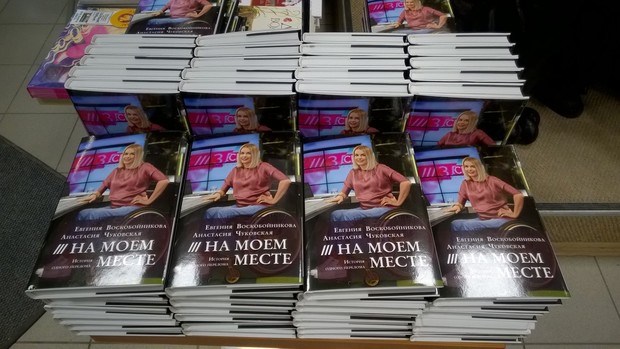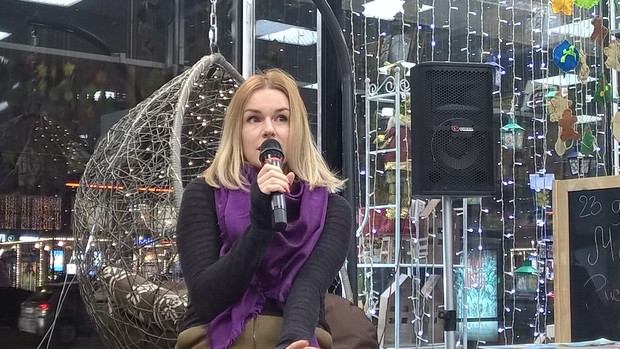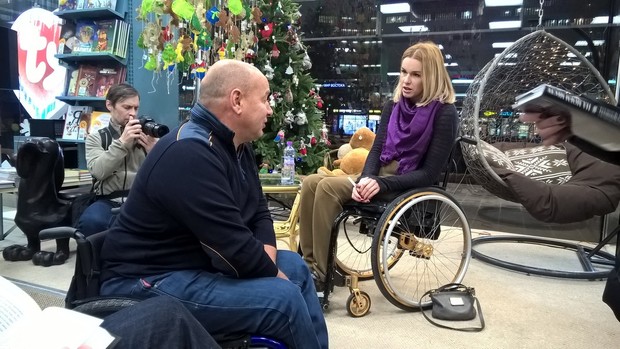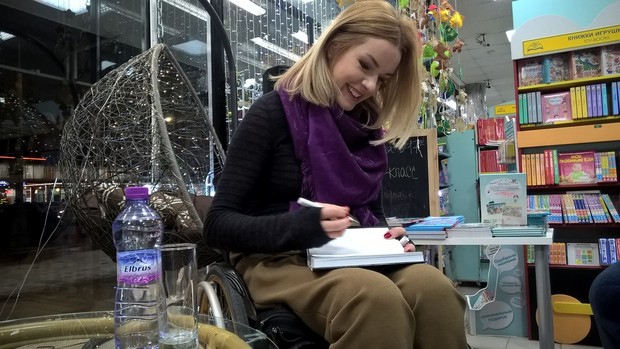Evgeniya Voskoboinikova: ''I'm one hundred percent sure that my book is positively charged''
A journalist of Dozhd TV channel believes that soon the topic of persons with disabilities will be fashionable, and if an employer refuses to hire a disabled person it will be considered a bad manner
Moscow hosted a presentation of the book by a presenter of Dozhd TV channel Evgeniya Voskoboinikova In my place. The story of a turning point. Immediately after the meeting with the readers Evgeniya talked to Realnoe Vremya and told about for whom she wrote the book. Read more in the article of our newspaper.
''We both knew that the society clearly had demand for such stories''
From the author's point of view — what is your book about? What's its most important task?
The understanding of the most important task, I'm sure, comes only over time. We, my co-author Nastya Chukovskaya (Anastasia Chukovskaya is a Russian journalist who previously worked in Dozhd TV channel — editor's note) and I was not thinking about a certain task, it is not a thesis and not a doctoral thesis, it is much more than just a text. It is emotions, memories, the essence of what happened to a man over a long period of time. This book is about labor, about will, overcoming, understanding and misunderstanding, and finally, about love. Everyone will find in it something of their own, perhaps, even what I expect!
How did you come up with the idea to write such book?
The idea came up spontaneously. We both knew that the society clearly had demand for such stories, and we as journalists couldn't help but take advantage of it. Nastya said, knowing a little of my story that it would be great to write about it. I said, ''So let's do it!'' and after about a year and a half our book was already on the shelves of the stores! But it is now so easy to talk about it, in fact, it is a big job: it is very laborious, ambitious emotional job. So many tears were shed, so many bouts of laughter… And the realization that we were writing something incredibly necessary, something that may be a great help for someone.
What image of a reader of your book you had in mind when you were writing it? Or, maybe, you wrote it in the first place for yourselves?
Actually, when we were writing it, we had nothing in mind. We even could not imagine that the book ever comes out, that someday we will have a presentation and we would be interviewed by whom we had imagined (laughs). As I thought initially, it must be people, trapped in a difficult situation as I did in an accident, or lost their sight, or something like that. Now we have, unfortunately, a lot of cancer patients, it is the scourge of our time. No psychology can help to cope with it. My book should at least distract them and their families from the difficulties. Nastya, in addition to talking with me, was communicating with my friends, former boy friends, with my psychologist. And the psychologist said that this is a very important text, because in our country we do not anything like that yet. We have science books, but no fiction. And my book is for everyone.

It is not a thesis and not a doctoral thesis, it is much more than just a text. It is emotions, memories, the essence of what happened to a man over a long period of time. This book is about labor, about will, overcoming, understanding and misunderstanding, and finally, about love
If this book originally was your diary, did it differ significantly from what we have now?
I think yes, it would be different. In a diary you record more of your emotions at the particular stage, and it greatly affects your mood at this particular period of time. But when we were writing the book, it was after some time. Of course, if I started writing a book being in intensive care (I had an opportunity because I had a lot of free time), the emotional component would have been completely different. Everything would be all awfully, terribly, horribly, black ugly. Hardly anyone would want to read it. But when those emotions pass, and what remains is the realization that it happened to you, and you can compare what the message of this writing is different.
So, for us the book is more valuable in the form in which it came out?
Yes, because I'm one hundred percent sure that it is positively charged.
You have met with Nick Vujicic (an Australian writer, a child who suffers from phocomelia, a rare disorder characterized by the absence of legs and arms – editor's note), who also wrote a few life-affirming books. How has his example affected you in the decision to make your story public? Maybe, he has motivated you?
When I met Nick, our book has been partially done, and I had no doubt that sooner or later it would be published. Nick charged me positively, these people on the planet are few, I'm talking about external and internal component. I was very impressed with his professionalis, he did not make allowances for his state and he did not allow for these discounts to others. It is worthy of great respect. And, of course, for me it was a great honor to interview him.
I had never seen a presenter of news in a wheelchair, you were the first for me. Was it hard to decide to reappear in the frame sitting in a wheelchair?
I was not thinking how difficult it was, how natural it will look. You are just put in the frame and they say: here is a prompter, here's papers, here's ''ear'', in which you will receive instructions from the director. Work! It was like that, and I said yes, I will work, no matter how difficult it can be. I said it in the first place to myself. And in some moments it was very difficult: I had tantrums, breakdowns, as any human being has who decided on a responsible profession, which often has extreme moments. And live, regardless of how professional you are and how quick your reaction is, it's still very hard emotionally. People constantly look at you and constantly assessing you. What is more, our channel has a quite harsh audience. So I am prepared for any assessments.

Live, regardless of how professional you are and how quick your reaction is, it's still very hard emotionally. People constantly look at you and constantly assessing you. What is more, our channel has a quite harsh audience. So I am prepared for any assessments
''Global shift is tangible: people have begun to pay attention to the problem of inaccessibility for disabled people, they began to speak about it''
What difficulties you had immediately after the tragedy?
It is very difficult to enumerate the difficulties that a person faces who broke the spine. In fact, I devoted the whole book to that (smile). But in short, it's like you had was living, making plans, you were confident, and then suddenly you with your plans and self-confidence was moved to another planet and they said, ''Now you're going to live here. Always...''

It is very difficult to enumerate the difficulties that a person faces who broke the spine. <...> It's like you had was living, making plans, you were confident, and then suddenly you with your plans and self-confidence was moved to another planet and they said, ''Now you're going to live here. Always...''
If I understand correctly, now you help people with disabilities. Could you tell us what you do you do, what projects are engaged in, what successes you have achieved?
I can't say that I am engaged in some help on a permanent basis. To the possible extent, we together with Dozhd we do joint projects with charities, we had a big project for employment ''All different — all equal''. But mostly my help is information one. And, of course, I am trying to help with advice and I always try to respond to messages in social networks, which are sometimes many.
How would you describe the infrastructure in Moscow for people with disabilities? What is the situation in the regions, for example in Voronezh (Evgeniya was born and was living for long time in Voronezh — editor's note)?
I often and much talk about it, and not only I: now in Moscow and in Russia there are a lot of socially active people with disabilities. Importantly, global shift is tangible: people have begun to pay attention to the problem of inaccessibility for disabled people, they began to speak about it, and I consider it my credit as well at some extent.
Do you have a special influence and authority over state and public organizations as ''a women in TV''?
I have rights as a person with first group of disability, prescribed by law, I have knowledge of these rights, confidence and a little arrogance, and while this it is enough to communicate with any organizations. And the administrative resource, which, of course, I use very rarely, almost never.
Do people turn to you for advice and consultation on various issues related to the lives of people with disabilities?
Yes, frequently, mainly in social networks. If possible I try to answer.

Now in Moscow and in Russia there are a lot of socially active people with disabilities. Importantly, global shift is tangible: people have begun to pay attention to the problem of inaccessibility for disabled people, they began to speak about it
In a store I have recently been served by a woman with a hearing impairment. You are a presenter on television. Is it possible to say that in Russia there the trend of openness and availability of the environment — city and working — for the ''other'' people have come?
This trend appeared, I think, three years ago, it is now becoming more popular. Moreover, I hope that very soon the topic of disabled people will be fashionable, and not if a employer does not hire a person with disabilities it will be considered a be bad manner.